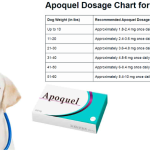If you have a pet dealing with allergies, then you might have heard of Cytopoint from your vet or any other advisers. Cytopoint is one of the most effective allergy management medications that help to soothe all the allergic issues in pets by following an innovative treatment approach.
For further knowledge, click here…
Key Takeaways
- Cytopoint is a medication used in the treatment of allergies in dogs.
- Pet owners should understand the potential side effects and adverse reactions that may occur with Cytopoint treatment.
What Are the Common Side Effects of Cytopoint?
Cytopoint is generally well-tolerated by dogs, with most experiencing minimal side effects. However, some dogs may experience general and temporary side effects after receiving a Cytopoint injection.
Drowsiness
One common side effect of Cytopoint is drowsiness. Your pet might seem tired after receiving the medicated injection and might not be active. This drowsiness could fade within a few days.
Redness or Swelling at Injection Site
Another general side effect is itching and swelling in and around the injection site. This is a normal reaction caused by the injection that might be slightly harsh. If this reaction doesn’t heal within a day or two, you should seek veterinary guidance.
Vomiting and Diarrhea
Some dogs may start vomiting or diarrhea after receiving a Cytopoint injection. This is a short-lived effect that disappears in a day or a few. In case of further problems or any long-lasting problems, you are advised to contact your vet.
After a Cytopoint injection, dog owners must observe their pets and notify their veterinarian of any worrying signs. Most dogs tolerate Cytopoint well and experience minimal side effects, but it is essential to be aware of the potential risks.
Are There Any Serious Adverse Reactions to Cytopoint?
Despite being typically safe, there is a slight chance that Cytopoint will cause significant side effects. Although they are not that common, it is still better to be careful and not take a risk. Some dogs might experience mild and negligible reactions, while others might face dangerous issues. Although not every pet patient will experience these symptoms, it is best to be cautious.
Additionally, some dogs may suffer from more serious side effects such as diarrhea, vomiting, anaphylaxis, or lethargy. Severe allergic reactions, including anaphylaxis, can occur rapidly and result in shock, collapse, and difficulty breathing. Owners of pets need to be aware of the warning symptoms of anaphylaxis and take their dogs to the doctor as soon as they think they could be suffering from it.
After your dog has received medication, you must call your veterinarian right away if your dog starts acting strangely. They may recommend adjusting the dosage or exploring alternative treatment options if the side effects persist.
How Long Do Cytopoint Side Effects Last?
As mentioned earlier, the side effects of Cytopoint are generally mild and temporary. Most dogs tolerate the medication well, and side effects, if they occur, tend to resolve within a day or two. However, it is essential to closely monitor the dog for any potential side effects and promptly report them to the veterinarian if they persist or worsen.
Occasionally, the length of side effects could change based on how each dog reacts to the drug. It could take a dog longer to recover if they have more severe adverse effects. Nevertheless, most dogs can tolerate Cytopoint without experiencing any serious adverse effects; thus, this is an uncommon occurrence.
Pet owners must speak with their doctor if they worry about how Cytopoint will affect their dog. To reduce the possibility of future side effects and guarantee the dog’s safety and well-being, the veterinarian could advise changing the dosage or looking into alternate forms of treatment.
Can Cytopoint Cause Allergic Reactions?
Dogs may often tolerate Cytopoint without any problems. Rarely, dogs may, however, already have a history of drug allergies. Before starting Cytopoint treatment, it’s critical to let your veterinarian know whether your dog has ever had allergies.
If you have any of the following symptoms, you should seek emergency veterinary care since allergic reactions to Cytopoint can be dangerous.
- Difficulty breathing
- Facial swelling
- Hives or rash
If any of these reactions are seen in your pet after the intake of Cytopoint, then it is better to contact your vet without any delay.
How to Minimize the Risk of Cytopoint Side Effects?
Cytopoint carries the usual minor risk of side effects associated with any drug. Pet owners can, however, take certain precautions to lessen the possibility that their dog will suffer from these adverse consequences.
- Follow the veterinarian’s dosage instructions carefully, and do not administer more or less Cytopoint than prescribed.
- Following each Cytopoint injection, closely monitor the dog for any signs of side effects, such as fatigue, nausea, or diarrhea.
- Inform the doctor right away if you experience any side effects. Seek emergency veterinary treatment right immediately if there are any severe adverse effects.
- Before starting Cytopoint treatment, pet owners should also disclose to their physician any allergies that their dog may have had in the past.
This will enable the veterinarian to take appropriate precautions and adjust the dosage if necessary.
Although most dogs tolerate Cytopoint well and have few adverse effects, it is vital to know the medication’s potential side effects. Pet owners can assist in guaranteeing their dog’s safety and reduce the possibility of any adverse reactions by adhering to these straightforward procedures.
What Steps Should I Take If My Dog Has Adverse Reactions?
It’s critical to take quick action to protect your dog’s health and wellness if they encounter any Cytopoint adverse effects. The first step is to contact your veterinarian to report the symptoms and seek guidance.
Your veterinarian may recommend adjusting the dosage or frequency of Cytopoint injections to alleviate the side effects. Sometimes, they recommend discontinuing Cytopoint and exploring alternative treatment options.
It is essential to carefully monitor your dog for any unusual or concerning symptoms after receiving a Cytopoint injection. This means keeping an eye out for any redness, swelling, or discharges at the injection site, in addition to keeping an eye out for any signs of nausea, dizziness, or diarrhea.
If you see any severe or life-threatening symptoms, including breathing difficulty, face swelling, or hives, get emergency veterinarian care as soon as possible. These symptoms may lead to a severe allergic reaction to Cytopoint.
Remember, early identification and treatment of side effects is crucial to ensuring your dog’s health and safety.
Risks vs. Benefits: Is Cytopoint Worth It?
Even though Cytopoint is typically safe and efficient in treating dog allergies, pet owners must consider the advantages and disadvantages of this medicine. It is impossible to overlook the possibility of side effects, negative responses, and problems.
It is important to remember that doctors thoroughly assess each case, considering the dog’s medical history, present health, and any risk factors, before administering Cytopoint. Dog owners must discuss openly with their veterinarians to make well-informed decisions about their dog’s medical care.
Conclusion
- Be Aware of Side Effects: Understand that Cytopoint, while safe, can have side effects like drowsiness, diarrhea, vomiting, and injection site reactions, which are generally mild and temporary.
- Watch for Severe Reactions: Recognize severe allergic reactions such as hives, facial swelling, or breathing difficulties, and seek immediate veterinary help.
- Monitor Your Dog: Keep a close eye on your dog after Cytopoint injections for any adverse effects, which usually resolve within a few days.
- Follow Veterinary Instructions: Adhere strictly to your vet’s guidance on dosage and frequency of Cytopoint injections for the safest treatment.
- Communicate with Your Vet: Inform your veterinarian about any of your dog’s known allergies before starting Cytopoint treatment.
- Assess Risks and Benefits: Understand that the benefits of reducing allergy symptoms with Cytopoint often outweigh the minor risks of side effects.
- Engage in Open Dialogue: Have honest discussions with your vet to make informed decisions about your dog’s allergy management.
- Partner with Your Vet: Work closely with your veterinarian to ensure the best care for your dog, minimizing the risk of adverse reactions to Cytopoint.










